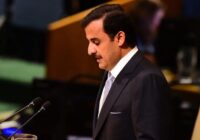The media and public diplomacy war between Qatar and its Gulf detractors is escalating. Expect to see some hidden skeletons revealed.
Lurking below the surface of the Gulf crisis are rival, yet troubled attempts by Qatar and its detractors to use sports to boost soft power and/or launder tarnished images of their autocracies. Ironically, the crisis threatens to have leveled the playing field in a bitter media and public diplomacy war that was covert prior to the seven-week-old diplomatic and economic boycott of Qatar. If anything, the Gulf crisis has emerged as a case study of the pitfalls of reputation management in which sports is an important tool. On balance, it has so far had different effects on the reputations of three of the key protagonists.
NORTH KOREA AND THE GULF
It has also served to highlight the pot-blames-the-kettle-character of the crisis, most recently with the disclosure that North Koreans were employed not only in Qatar, but also on an Emirati military base that hosts US forces. The disclosure of relations with North Korea is awkward at a time of increased tension between Pyongyang and Washington over the pariah state’s ballistic missile and nuclear program.
The Institute for Gulf Affairs, a Washington-based Saudi dissident group, recently published a memo reportedly from the US State Department — as well as emails from the hacked account of Yousef al-Otaiba, the high-profile Emirati ambassador to the United States — which asserted that a UAE company, Al-Mutlaq Technologies, had bought $100 million-worth of weapons from North Korea for use in the Saudi-led military campaign in Yemen.
Qatar, plagued by allegations that its successful bid to host the 2022 World Cup lacked integrity and that its migrant labor regime amounted to slavery, has scored reputational gains in the Gulf crisis despite the revelations related to North Korea. While the claims reinforced concerns about Qatar’s policies and labor regime, they also suggested that issues at stake in the standoff constituted regional problems rather than exclusive concern about just one Gulf state.
The United Arab Emirates — a driving force in the anti-Qatar campaign that uses the hosting of global sporting events to boost its image — has suffered because of its failure and that of its allies to garner widespread international support for its tactics and demands that were perceived as unreasonable, unactionable and designed to undermine Qatari sovereignty and independence. The UAE’s North Korea link as well as allegations by human rights groups, which the government in Abu Dhabi denies, that the Gulf state was backing the abuse of prisoners in Yemen has done little to enhance its reputation.
Qatar and the UAE’s North Korean links could put the two Gulf Cooperation Council (GCC) members in the Trump administration’s firing line as it considers how to respond Pyongyang’s most recent ballistic missile test, which the pariah state claims would allow it to target any US city. Pressuring countries to back away from economic relations with North Korea, the US recently extended sanctioning of Sudan for, among other things, not being fully committed to implementing United Nations sanctions on the North Koreans.
Earlier this month, Saudi Arabia promised Sudanese President Omar al-Bashir that it would continue with diplomatic efforts to try improve relations between Sudan and the US despite the African country’s refusal to join the Saudi-Emirati-led boycott of Qatar.
Neither the Gulf crisis nor sports has done much for Bahrain — its image tarnished by its brutal suppression in 2011 of a popular revolt with the help of Saudi and Emirati forces, and its subsequent repression of opposition forces and continuous violations of basic human rights. Worse even, the Gulf crisis has focused attention on Bahrain’s failed effort to use sports to polish its tarnished image and put it in the spotlight as an example of the degree to which smaller GCC states risk losing their ability to chart an independent course.
THE MEDIA AND PUBLIC DIPLOMACY WAR
As the quarrelling GCC members pour millions of dollars into hiring public relations and lobbying firms in Washington and elsewhere — with the UAE as the largest spender — Qatar can shrug off in both reputational and financial terms a $52,000 fine by world soccer body FIFA. Qatar was penalized because its national team wore jerseys in a World Cup qualifier against South Korea that featured an illustration of Emir Sheikh Tamim bin Hamad al-Thani. The drawing has come to symbolize a wave of Qatari nationalism sparked by the Gulf crisis.
The public diplomacy war has expanded beyond a constant diet of allegations against one another in state-controlled media into Saudi-sponsored TV spots on US networks and rival advertisements on London’s famous black cabs, which alternatively feature a pro-Qatari message, a Saudi soccer match, and the UAE’s Emirates and Etihad airlines.
Qatar, in the latest move of the public diplomacy war, hired a Washington lobby firm originally established by Corey Lewandowski, the former election campaign manager of US President Donald Trump. Lewandowski has since left the firm over a dispute with his partners, who include Barry Bennett, a Trump campaign adviser, and others with ties to the president as well as George Birnbaum, an American-born former chief of staff to Israeli Prime Minister Benjamin Netanyahu who has close relations with the Republicans. Qatar has separately contracted the services of Information Management Services, a company that specializes in digging up dirt on US politicians.
For its part, the UAE, in the years running up to the Gulf crisis, hired a US firm established by former Treasury Department officials to influence US media reporting on Qatar. The media war could potentially enter a new phase with the acquisition by a relatively unknown Saudi businessman, Sultan Muhammad Abuljadayel, of an up to 50% stake in Independent Digital News and Media, the holding company that publishes Britain’s left-wing The Independent daily. The Independent has consistently been critical of the kingdom. Evgeny Lebedev, the Russian owner of paper’s parent company, ESI Media, recently saw his shareholding fall below 50%.
At the bottom line, the escalating media and public diplomacy war between Qatar and its Gulf detractors is as likely — as is evident with the revelations about North Korea — to put on public display some hidden skeletons as it is likely to contribute to attempts to polish tarnished reputations and influence attitudes and policies in Western capitals.
A key tool in the protagonists’ quivers, sports is proving to be a double-edged sword, as it too has the potential of shining the light on practices and policies that GCC states would prefer to keep out of the public domain.
The views expressed in this article are the author’s own and do not necessarily reflect Fair Observer’s editorial policy.
Photo Credit: Paul Cowan / Shutterstock.com
Support Fair Observer
We rely on your support for our independence, diversity and quality.
For more than 10 years, Fair Observer has been free, fair and independent. No billionaire owns us, no advertisers control us. We are a reader-supported nonprofit. Unlike many other publications, we keep our content free for readers regardless of where they live or whether they can afford to pay. We have no paywalls and no ads.
In the post-truth era of fake news, echo chambers and filter bubbles, we publish a plurality of perspectives from around the world. Anyone can publish with us, but everyone goes through a rigorous editorial process. So, you get fact-checked, well-reasoned content instead of noise.
We publish 2,500+ voices from 90+ countries. We also conduct education and training programs
on subjects ranging from digital media and journalism to writing and critical thinking. This
doesn’t come cheap. Servers, editors, trainers and web developers cost
money.
Please consider supporting us on a regular basis as a recurring donor or a
sustaining member.
Will you support FO’s journalism?
We rely on your support for our independence, diversity and quality.






